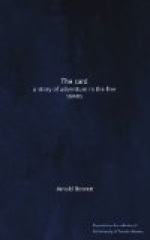Thus for Sir Jee there were two titled beings in the group—the Countess and himself. The Countess and himself formed one caste in the group, and the rest another caste. And although the Countess, in her punctilious demeanour towards him, gave due emphasis to his title (he returning more than due emphasis to hers), he was not precisely pleased by the undertones of suave condescension that characterised her greeting of him as well as her greeting of the others. Moreover, he had known Denry as a clerk of Mr Duncalf’s, for Mr Duncalf had done a lot of legal work for him in the past. He looked upon Denry as an upstart, a capering mountebank, and he strongly resented Denry’s familiarity with the Countess. He further resented Denry’s sling, which gave to Denry an interesting romantic aspect (despite his beard), and he more than all resented that Denry should have rescued the Countess from a carriage accident by means of his preposterous mule. Whenever the Countess, in the preliminary chatter, referred to Denry or looked at Denry, in recounting the history of her adventures, Sir Jee’s soul squirmed, and his body sympathised with his soul. Something in him that was more powerful than himself compelled him to do his utmost to reduce Denry to a moral pulp, to flatten him, to ignore him, or to exterminate him by the application of ice. This tactic was no more lost on the Countess than it was on Denry. And the Countess foiled it at every instant. In truth, there existed between the Countess and Sir Jee a rather hot rivalry in philanthropy and the cultivation of the higher welfare of the district. He regarded himself, and she regarded herself, as the most brightly glittering star of the Five Towns.
When the Countess had finished the recital of her journey, and the faces of the group had gone through all the contortions proper to express terror, amazement, admiration, and manly sympathy, Sir Jee took the lead, coughed, and said in his elaborate style:




